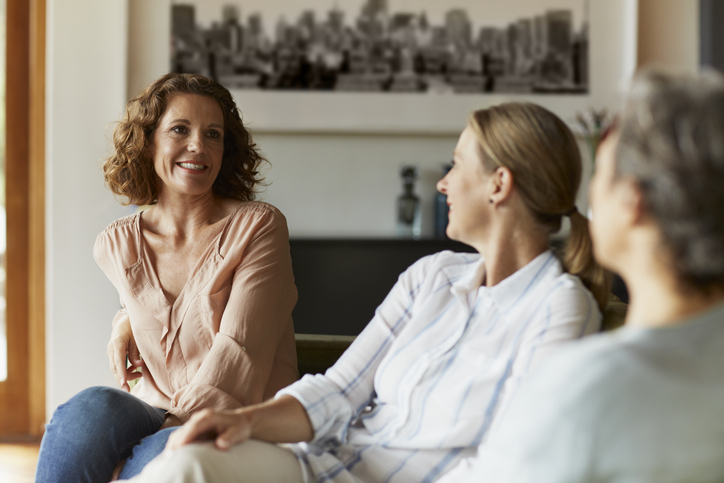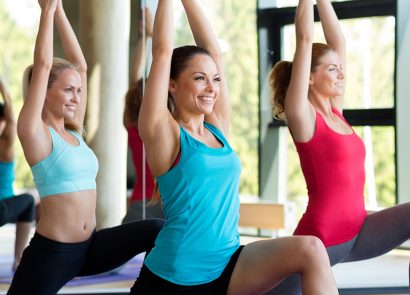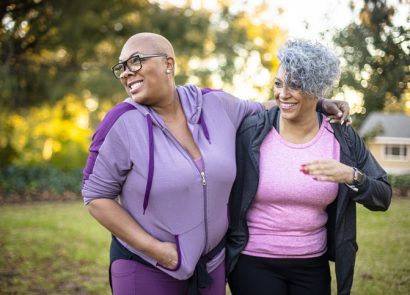Although the most severe Covid-related restrictions were lifted a while ago now, it’s fair to say that many of us are still trying to find our feet in social situations. After months of Zoom meetings, living in lounge wear and trying to have meaningful conversations while sticking to the two-metre rule, being surrounded by people once again can seem strange. And, who can blame us? The lockdowns we faced in 2020 and 2021 were unlike anything we’ve ever experienced, and after spending so long avoiding in-person interaction, we’re bound to feel a little bit rusty – and anxious – in the social sphere.
“The first time I was ‘allowed’ to meet friends in one of their houses, my anxiety went through the roof,” says 35-year-old Fiona Minett, a PR coach (bossyourpr.com) and mum-of-one. “I nearly cancelled; I was agonising over how irrational it all felt – it just felt so alien to be stepping foot into a friend’s house and the logical side of my brain really struggled to reconcile with the whole notion of being ‘allowed’ to do that but not being ‘allowed’ to do so much else.”
Fast forward to today and Fiona is still finding some social gatherings overwhelming. “I’m not naturally ‘sociable’ as such, but working in PR and events for more than a decade has meant that I have become very much used to a work life pretty full of socialising,” she says. “However, I have definitely found my introvert tendencies and propensity for anxiety have accelerated over the past year and a half. Everything just feels like a much ‘bigger deal’ now; whether it should or not.”
Fiona’s situation isn’t unusual or unique and, as psychotherapist, relationship expert and wellbeing warrior Lucy Beresford (lucyberesford.com) says, it’s only normal to feel some degree of social anxiety after such a life-changing event.
“Covid and the lockdowns associated with it forced us to reduce our interaction with other human beings, sometimes to the point where an individual living alone might not have interacted with anyone apart from a supermarket delivery driver for months on end,” she says. “Fears around the virus and infection, confusion over any safety messaging, and lockdowns have amplified feelings of social anxiety for some people. Very real worries around getting infected have combined with reduced experiences of the joys of socialising, and this has led to a perfect storm of worry.”
And it’s not just Covid-related anxiety that has impacted our ability to socialise with ease. To put it simply, many of us are out of practice – and the idea of stumbling over our words or not having anything to talk about is a genuine concern for some.
It’s not a completely unfounded worry either. Research shows that social isolation and loneliness (which many of us experienced during lockdown) can have an impact on both how our brains work and our ability to socialise effectively. Studies suggest that regular interactive stimulation helps our minds work quickly and maintains good memory and recall, while reduced interaction can diminish these skills over time. Chronic stress – like the type some of us have experienced over the past two years – has also been found to shrink the size of the prefrontal cortex, which is the part of the brain responsible for things like attention, memory and cognitive flexibility. And, then there’s the sluggishness and fatigue that many people are reporting as a result of the pandemic – things that definitely aren’t conducive to a gripping conversation with friends.
With all this in mind, it’s no wonder that our socialising skills may have slipped a bit.
Relearning an old skill
So could it be that we have forgotten how to socialise? Thankfully, Dr Zoe Cross, a clinical psychologist at My Online Therapy (myonlinetherapy.com), says it’s not as drastic as that.
“It’s more that our social skills haven’t really been required during lockdown and the ongoing pandemic,” she explains. “We’re just out of practice and haven’t had the same opportunities to spend time in social situations that we may have done pre-Covid.”
This idea is further complicated by the fact friendships – and socialising – have changed hugely since the start of the pandemic, meaning our old habits may not be entirely relevant anymore.
“Socialising has changed in a number of ways, from how spontaneous meet-ups might be to how many people are gathered together,” affirms Lucy. For many, gone are the days where you’d crowd into a pub with a big group of friends, waiting for your turn at the bar while surrounded by others doing the same. Instead, it seems a large number of people are opting for small-scale gatherings at places they feel comfortable and where they’re able to maintain distance from others. There’s even a new term: HOGO (the hassle of going out), which relates to the fact many of us are ditching plans to go ‘out out’.
Friendships, too, have been through the ringer, with data from a large French survey conducted during the country’s lockdown showing that while a small number of friendships were strengthened during this time period, a large number petered out as a result of restrictions. They called the effect ‘relationship funnelling’ – relating to the fact that a small number of key connections were being prioritised, leaving others to fall by the wayside. Rekindling these friendships – if we desire – requires skills that we might not have close at hand.
The new friendship rules
Experts agree that a slightly different approach is needed at the moment.
“Some of our social skills will have become dormant but, like riding a bicycle, we will find that we’re soon able to pick up the cues of conversation or how to read body language as before,” says Lucy. “But what’s interesting is that the pandemic has also provided us with the chance to maybe relearn some social skills, such as being a better listener or being alert for the friend who is struggling and needs some support.”
This is particularly important if you have friends in your group that have significant social anxiety. In Fiona’s case, having loved ones who really understand how she feels has helped her process her anxiety in her own time. “I am really lucky with my friends,” she says. “They know that at the best of times, I’m prone to falling off the radar slightly in the WhatsApp group chat or excusing myself from the occasional meet up, so they have really understood when anxiety has gotten the better of me.”
Lucy is clear that showing consideration, thought and compassion are key when building back up to socialising in a ‘normal’ way. “We need to be mindful of how we are feeling about re-engaging socially, and also how others might be feeling,” she adds. “We need to be more respectful of the boundaries others set for themselves, and we need to be compassionate if someone in our circle is reluctant to socialise at our pace.”
And there’s the idea of physical boundaries to consider, too. “We’ve definitely shifted our physical behaviours since the start of the pandemic,” says Zoe. “For example, in the early days handshaking was discouraged. Even though we’re now back to face-to-face socialising, we’re not sure if the other person is comfortable in engaging with these behaviours, and want to respect their boundaries.”
So, what to do in these situations? Experts suggest trying to take your cue from your friends and their body language – or you could even ask them: ‘Are we doing hugs?’ with no pressure attached. A full-on hug could be replaced by simply putting a hand on their arm – a physical acknowledgment that requires less distance. And, you could even take inspiration from our European friends. In France, the common way to greet people with a kiss on each cheek was replaced with a verbal version – the words ‘bisous’ (literally translated as ‘kisses’) – in the height of the pandemic. If you don’t want to hug or shake hands – say so, honestly and openly (a simple ‘I’m sorry, I don’t feel comfortable doing that at the moment’ will suffice), and a clear ‘nice to meet you’ with a nod and smile can also work well for strangers.
Finding your stride
Anxiety around seeing others – whether because of Covid-related worries or because we feel we’ve lost the art of socialising – is not something to brush over, and the simple fact is that some social interactions are likely to feel awkward for some time. The important thing to do, according to Zoe, is to try to find a way to see people that we feel comfortable with. That could mean ‘practising’ your social skills with the people you live with or starting with one-on-one meet ups and slowly building your confidence over time.
“It can be beneficial to see this through the framework of ACT (Acceptance and Commitment Therapy), where we work towards living a life based on our values and goals. In ACT, we work to manage difficult thoughts and emotions along the way, without allowing them to dictate our life,” she says.
“Get clear on your overriding goals and values in life. What are the things you really care about in life – and what’s the potential cost of not pursuing those things because of fear? For example, if you’re someone who feeds off social interaction, it might be worth tolerating some level of anxiety (while taking the necessary precautions) in order to benefit from socialising again.
“It’s about finding a balance between not giving in to anxiety in situations where you’re safe, and not putting yourself at risk or feeling like you need to push yourself harder unnecessarily. Once this has been established, you’ll feel more comfortable to re-engage with socialising.”
Lucy also advises treating yourself with compassion along the way. “If you feel anxious about an upcoming social situation, remind yourself how different life has been lately and that you are not alone in finding things strange or even unsettling,” she says.
She also recommends going to events with a friend who you can rely on and be prepared to make small talk. “Have a few topics up your sleeve which are unconnected to Covid or the pandemic as part of your repertoire,” she recommends. “For example, at a party you can ask a stranger what their favourite book, movie or super-power is.”
For Fiona, it’s been important for her to process things at her own pace. “I have started to socialise more in recent months; since my second vaccination in August 2021, but I’m not sure how long I’ll be comfortable doing this if the landscape and guidance shifts again,” she says. “I am tending to keep socialising to a pretty limited group of close friends and family at the moment. It’s definitely one step at a time and the anxious introvert in me will probably be overruling the logical side of the brain for a good while to come.”
Feeling nervous about socialising?
Zoe gives her advice on how to get back into the swing of it
- Go at your own pace. Don’t feel that you have to say ‘yes’ to everything that comes your way.
- Don’t avoid everything. This may seem easier in the short term, but in the long run it will only increase anxious feelings.
- Focus on what you can control, things like who you spend time with, and how you spend your time. This will help to manage uncertainty and anxious feelings.
- Focus on the present. Try not to worry about the ‘what ifs’. Mindfulness and relaxation strategies can often be helpful in these situations.
- Focus on your own situation. You don’t have to do what others are doing. Make gentle adjustments until your confidence is built up again over time.
- Try to show compassion. Be respectful of other people’s boundaries. Everyone will go at their own pace.




















